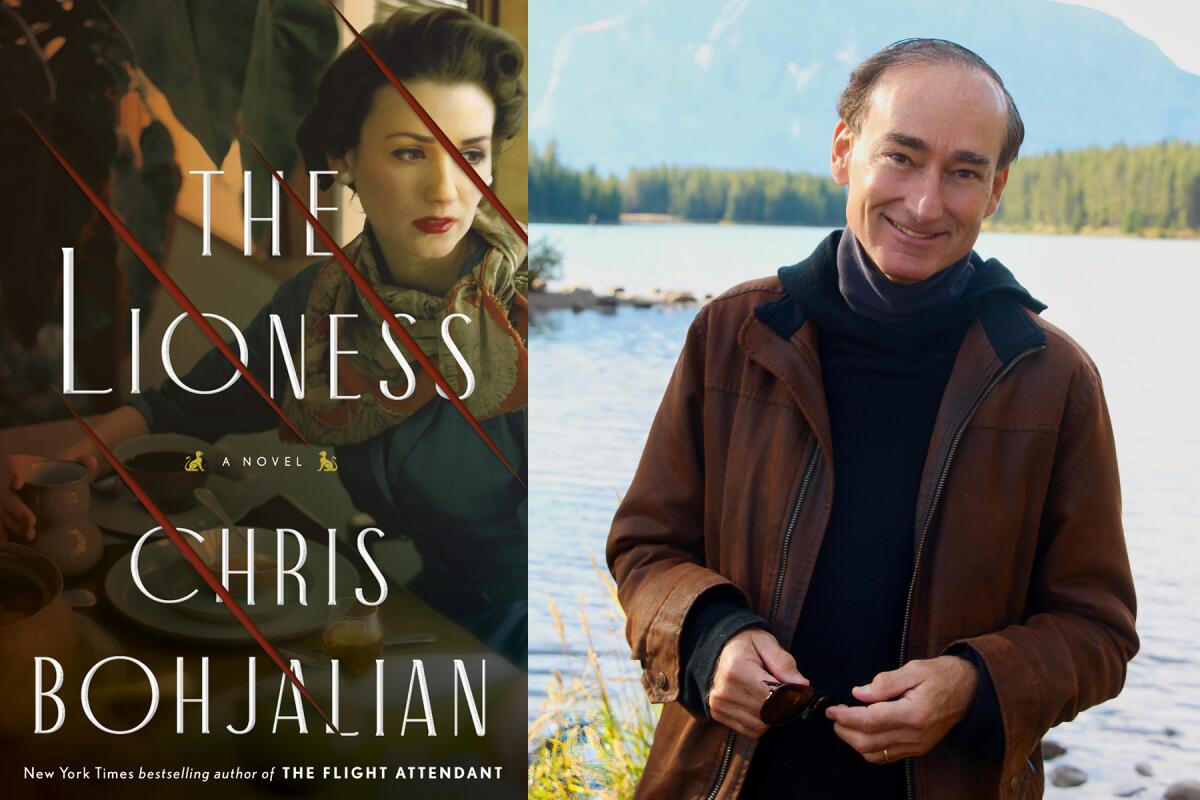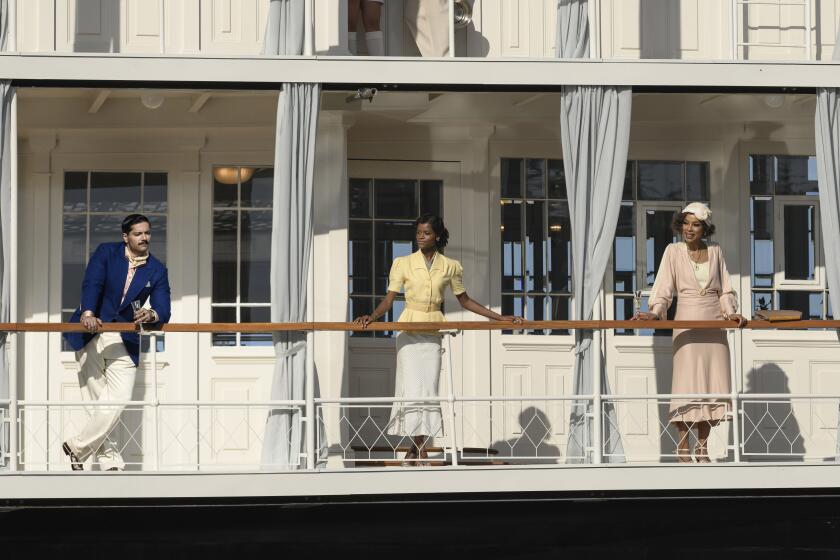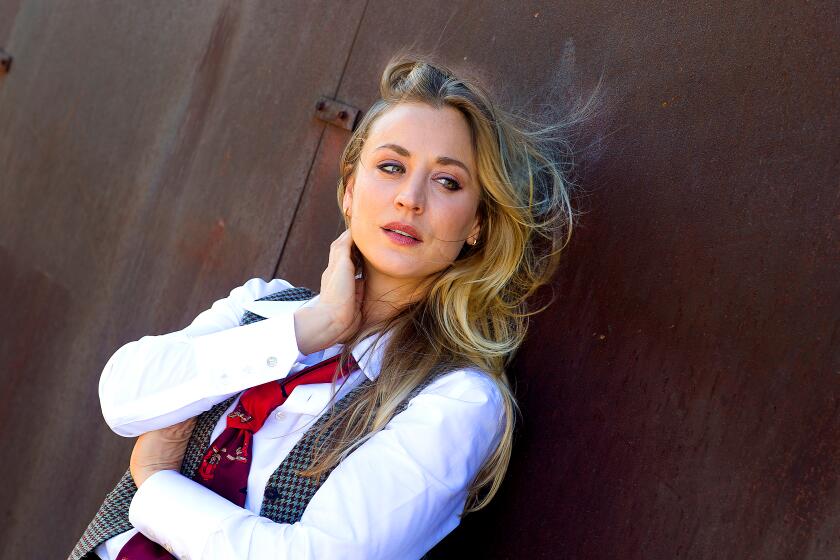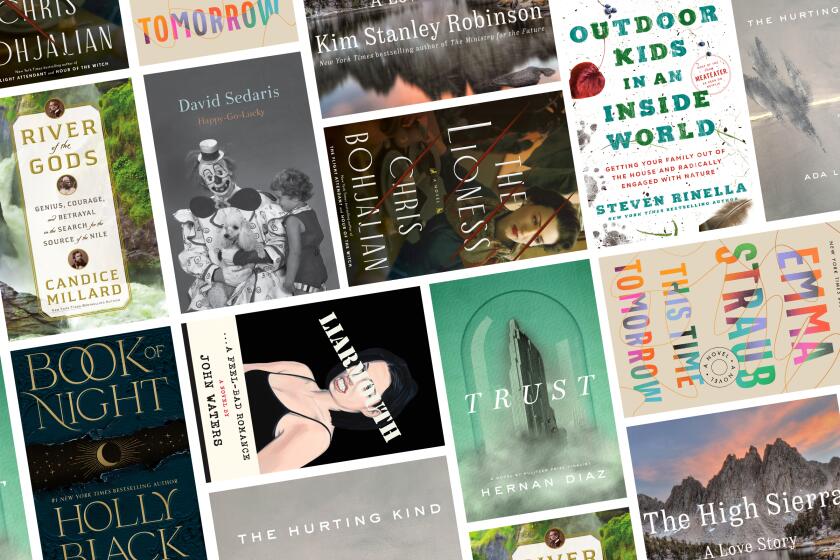Review: Why a new historical thriller on the Serengeti is better (sorry) than Agatha Christie

- Share via
On the Shelf
The Lioness
By Chris Bohjalian
Doubleday: 336 pages, $28
If you buy books linked on our site, The Times may earn a commission from Bookshop.org, whose fees support independent bookstores.
Chris Bohjalian, bestselling author of 22 novels, manages something rare these days: He combines prolific output with bona fide range and originality. His 2021 novel, “The Hour of the Witch,” about colonial Massachusetts, came out a year after “The Red Lotus,” about an American lost in contemporary Vietnam. “The Flight Attendant,” a contemporary thriller published in 2018, is now in its second season as an HBO Max series. And his new novel, “The Lioness,” takes place in early 1960s East Africa during a Hollywood star’s honeymoon safari.
Katie Barstow has reached the pinnacle: Not only is she a sought-after screen actor, she’s just married the love of her life, David Hill, a man she’s known since childhood who now works as a Los Angeles art gallerist. She’s beautiful and 30, and she has the means to bring along a robust entourage on her Serengeti trek: psychotherapist brother Billy and his pregnant wife Margie; best friend and fellow actor Carmen and her aspiring-agent husband Felix; her agent, director, and Terrance Dutton, her favorite co-star, who happens to be Black.
These old-school glampers plan “to photograph elephants, not shoot them,” while preserving all the creature comforts: canvas bathtubs filled nightly by their guides, a “kerosene-powered ice maker” (because “you had to have a proper gin and tonic at the end of a long day on safari”) and proper beds set up in their tents.
Best-laid plans. Bohjalian is at heart a thriller writer, eager to upend charming scenes of wildlife-spotting with a deadly twist. On a morning when the tourists and guides have filled two jeeps for an expedition, gunfire erupts. Most of the African guides are immediately killed, leaving one group speeding off to safety and another behind. Yes, more deaths will come, some of them quite surprising and gut-wrenching. For all its open sky, “The Lioness” better resembles an Agatha Christie locked-manor-house mystery, with bodies falling like clockwork, than a gripping survivalist yarn.
In the first of a new series reviewing Hollywood book adaptations, Bonnie Johnson asks if Kenneth Branagh’s latest Agatha Christie reboot is necessary.
Where Bohjalian one-ups Christie (with apologies to the grande dame) is in his character development, going beyond the primary question (what do these Russian mercenaries want with their kidnapped Americans?) to explore the psychology of the survivors. Each chapter alternates real-time drama with backstories that may or may not overlap. The result is a puzzle along two axes, interconnecting individual survival stories with a larger, much more sinister game afoot.

With the help of strategically placed clues, readers can figure out what the Russians are really up to, which is more than just collecting ransom. Yet the strength of “The Lioness” lies not in those twists and turns but in the backstories that illuminate them.
Ultimately, every single person’s motivation has something to do with their fate. Billy and Katie, for example, were brought up by hard-drinking and abusive parents whose pathologies still darken their children’s lives. When the mercenaries toss Billy into a dark tent by himself, he’s brought back to the many times his mother locked him overnight in a hall closet, alone and terrified.
This post-traumatic paralysis determines what will happen next to poor Billy, just as past is prelude for the rest of the glamorous crew. Bohjalian tracks his players as keenly as a leopard does its prey, matching psychology to fate with an almost pathological precision.
The former ‘Big Bang Theory’ actress is a first-time producer on the HBO Max comedy-thriller with hairpin tonal shifts.
Where this wears most thin is in the portrayal of African characters. One guide who survives, Benjamin Kikwete, and his older mentor, Muema Kambona, sound at times like Hollywood versions of themselves, using tired terms like “bwana” and saying improbable things about the landscape such as, “This could never grow tiresome.” On the other hand, Bohjalian also makes astute observations about these men whose livelihood depends on rich Western tourists. And he is smart enough to avoid cringeworthy dialect.
It must have been even more of a challenge to build Terrance Dutton as a character without succumbing to cliché, especially since Terrance stands in for so many Black actors of the time — a man brought in to add what 1960s filmmakers saw as exoticism, but never allowed to film a love scene with a white woman. Terrance comes alive in a way the guides do not, particularly when he muses on the Black actor Dorothy Dandridge’s relationship with married director Otto Preminger: “God, the things they had whispered … and that was Hollywood just a couple of years ago.” His bitterness over his relegation to belittling roles both on and off screen sets Terrance apart from the other survivors.
And yes, there’s a lioness among them, a woman whose power and determination lifts her above her comrades. As in many of his other novels, including “The Hour of the Witch” and “Secrets of Eden,” Bohjalian foregrounds a strong woman against a chaotic backdrop not to insist on gender equality, but to illustrate women’s particular and distinctive strengths. As on the savanna, this book’s lioness is partnered with a lion, an aging man whose deeply traumatic World War II service prepares him for the current struggle in ways he wishes it didn’t.
Eras change; so do the styles of movie stars and the types of honeymoons they take. But the entourage is eternal, and it’s the breakdown of one such group that gives Bohjalian a big cat’s feast of a plot. Drawing on its cast for both color and depth, “The Lioness” provides a meaty look at what makes us animals in what we call civilization — and what makes us human when we’re out in the wild.
Bethanne Patrick’s May highlights include new fiction by John Waters, Chris Bohjalian and Emma Straub, fresh David Sedaris, breakout poetry and more.
Patrick is a freelance critic who tweets @TheBookMaven.
More to Read
Sign up for our Book Club newsletter
Get the latest news, events and more from the Los Angeles Times Book Club, and help us get L.A. reading and talking.
You may occasionally receive promotional content from the Los Angeles Times.










